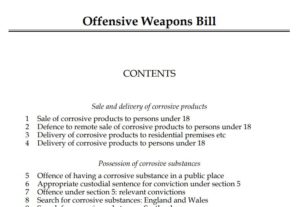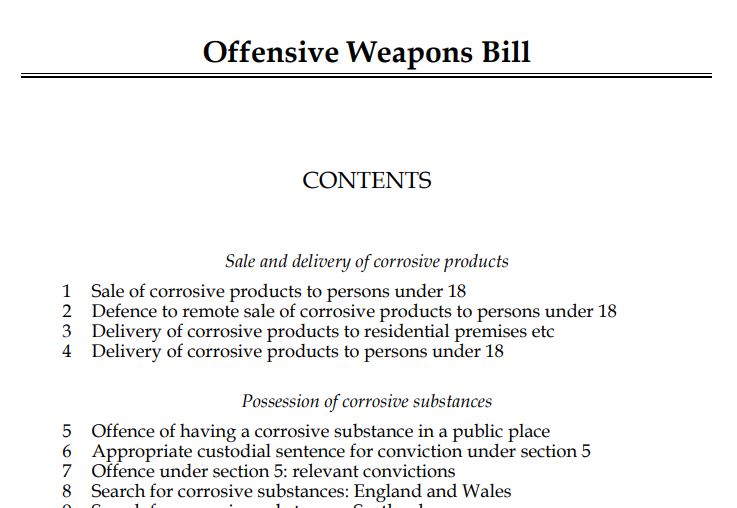 The government has published an Offensive Weapons Bill. The legislation is designed to signal a more stringent approach to the possession of weapons and liquids that can be used to cause harm, such as corrosive substances.
The government has published an Offensive Weapons Bill. The legislation is designed to signal a more stringent approach to the possession of weapons and liquids that can be used to cause harm, such as corrosive substances.
The Offensive Weapons Bill forms part of the government’s response to the recent rise in serious violence, set out in the £40m Serious Violence Strategy. This places a new focus on early intervention alongside robust law enforcement.
What is proposed in the Offensive Weapons Bill?
The following provisions feature in the bill:
- a new criminal offence of selling – both online and offline – a corrosive product to a person under the age of 18. The substances and concentration levels of what constitutes a corrosive product are set out in the Bill.
- a new criminal offence of possessing a corrosive substance in a public place. There is a defence of possessing the corrosive substance for a good reason. There is a minimum custodial sentence in England and Wales where a person is convicted for a relevant offence a second time. The offence will carry a maximum sentence of 4 years imprisonment.
- where a corrosive product or bladed product is sold online, the defence of having taken reasonable precautions can only be relied on where the seller meets certain conditions in terms of age verification and packaging and delivery of the items
- new criminal offences prohibiting the dispatch of bladed products and corrosive products sold online to a residential address. The offence for bladed products is limited to those that can cause severe injury and includes defences for made to order items and those for sporting and re-enactment purposes. The offence will carry a maximum sentence of 6 months imprisonment.
- new criminal offences in relation to delivery companies delivering a bladed article or a corrosive product on behalf of a seller outside the United Kingdom to a person under 18
- updating the definition of a flick knife and prohibition on the possession of flick knives and gravity knives (their sale etc. is already prohibited)
- amending existing law to make it a criminal offence to possess certain weapons (such as knuckledusters and death stars) – the sale and importation of these is already prohibited. It provides for compensation of owners
- extending the existing offences of possessing a bladed article or offensive weapon on school premises to cover further education premises in England and Wales and Northern Ireland
- amending the legal test for threatening with an offensive weapon in England and Wales
- prohibiting high energy and rapid firing rifles and a device known as a “bump stock” which increases the rate of fire of rifles. Existing owners will be compensated.
How we can help
Although the contents of the Offensive Weapons Bill are yet to be made law, in recent months the rhetoric around knife-crime has been ramped up by politicians seeking to respond to public concern about knife-crime.
Judges hear this and often react by imposing increasingly long prison sentences. These concerns have been reflected in the new guideline relating to sentencing those convicted of possessing offensive weapons.
It is our role to ensure that firstly our clients only enter guilty pleas when such a plea is appropriate. We will begin to prepare your defence from the very beginning of the investigation, so take advantage of our free and independent legal advice in police interview.
If you are to be sentenced for an allegation involving a weapon or a blade then we will make sure that relevant factors from the background to the offending is properly advanced in mitigation. The lives of young people in particular may be complex and some of the factors contributing to offending may be hidden.
It is our job to ensure that the full picture is presented to the court.
Alternatively you can use the contact form below:




